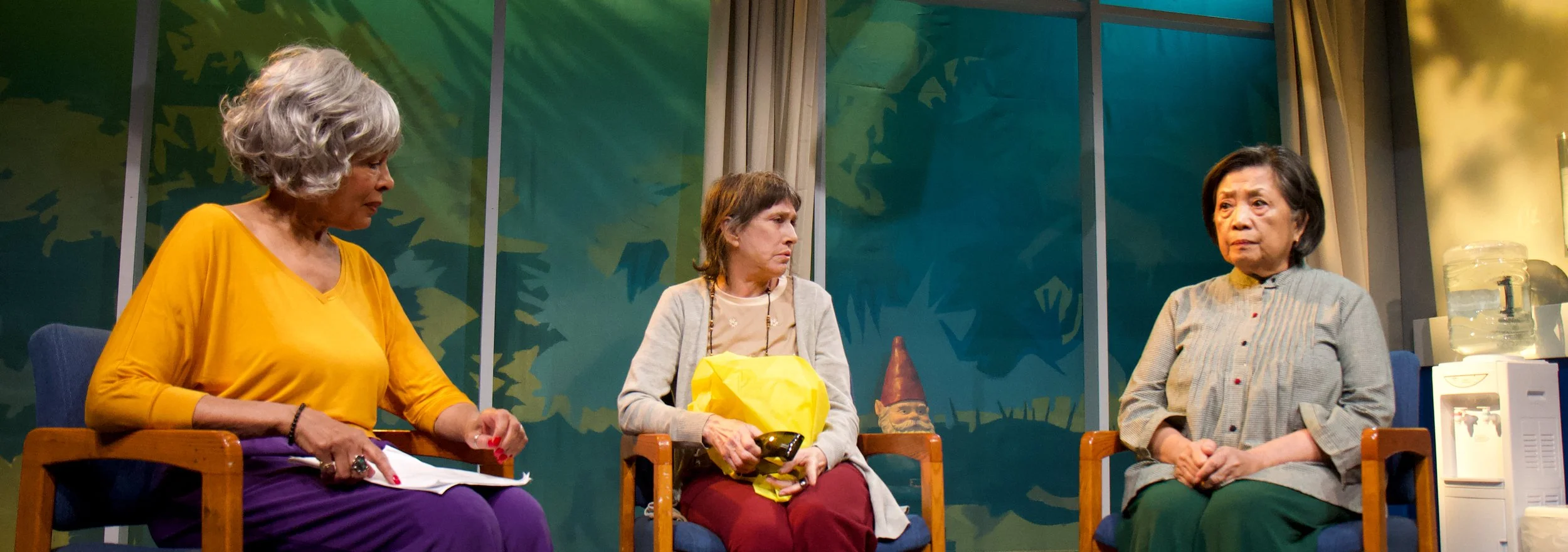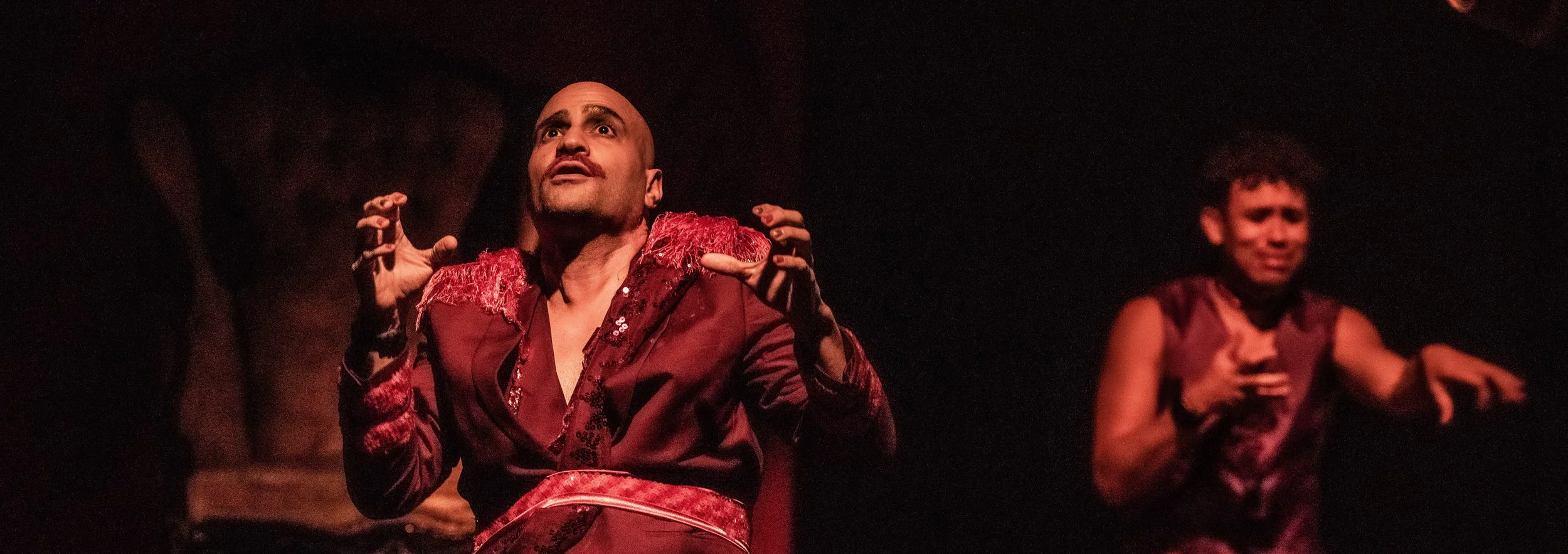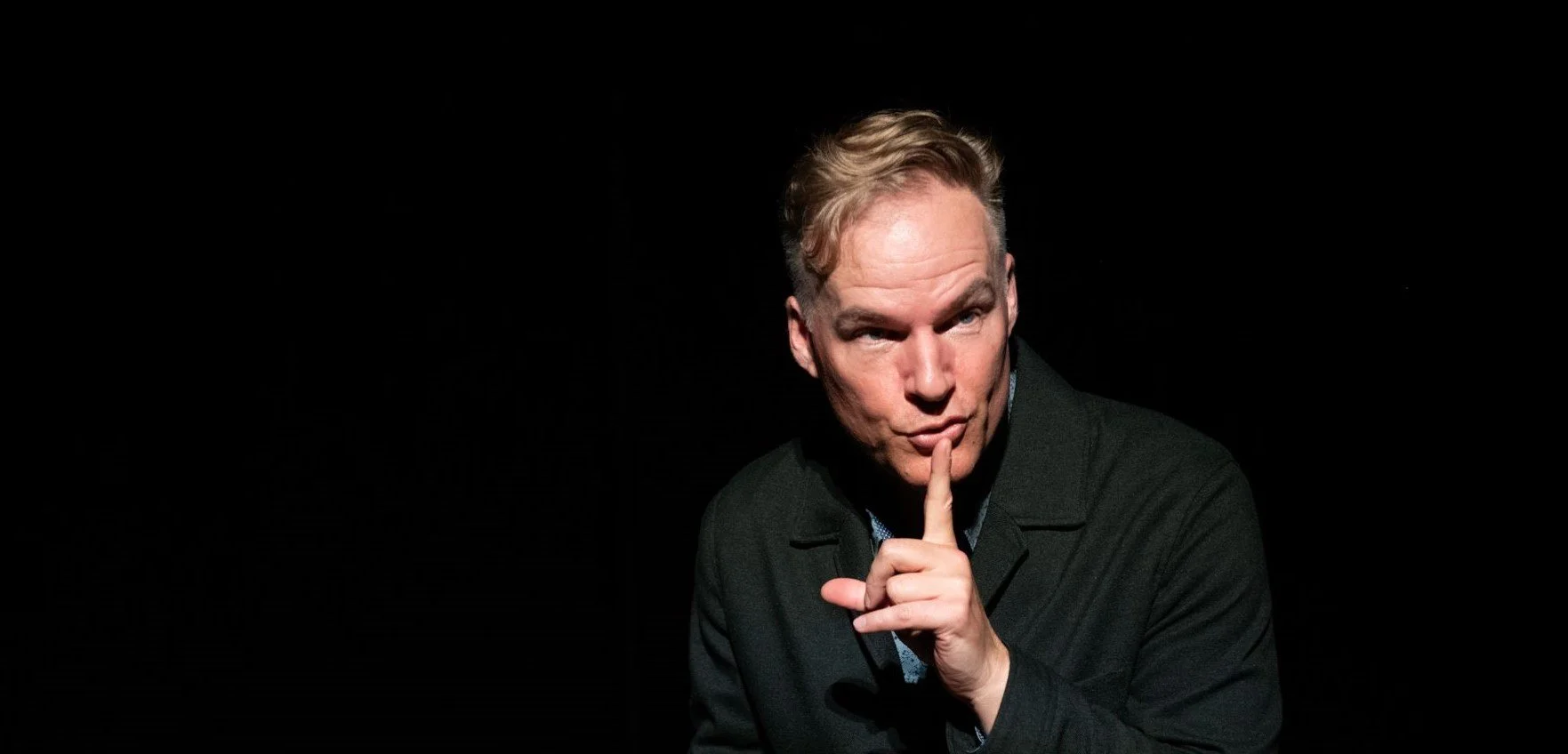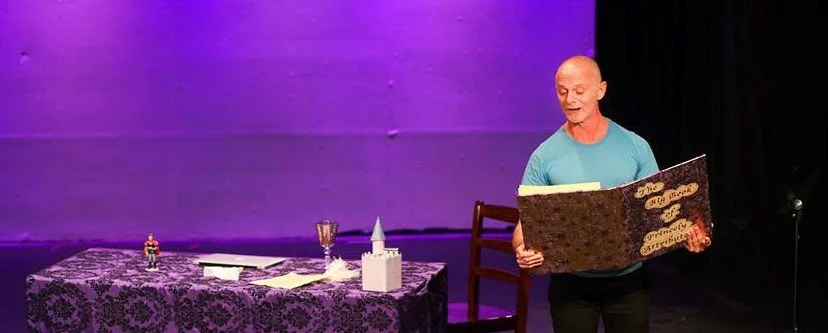Whether there will actually be any indictment remains highly speculative. But you might glean a modicum of excitement, and a laugh or three, from Indictment Excitement, the political standup fest now being presented at Theater 555, with a rotating roster of comics.
Peerless
This young Off-Broadway season has already seen two new plays riffing on Macbeth, both written and directed by women and both having to do with college. Sophie McIntosh’s Macbitches, which wrapped its run at the Chain Theatre a month ago, was set in a university theater department that’s shaken up when a freshman wins the role of Lady Macbeth instead of the star senior. And now Primary Stages has debuted Peerless, Jiehae Park’s fast-talking dark comedy about Asian American siblings hell-bent on getting into the most prestigious university.
As You Like It
Maybe it’s the Jan. 6 mob attack on the U.S. Capitol and the subsequent House Committee hearings this past summer, but the idea of fleeing to the Forest of Arden has rarely been so enticing. Directors often reinvent it as a rowdy retreat, replete with music and dance, but in Lynnea Benson’s production of Shakespeare’s As You Like It, Arden is mellow, soft, and dappled in sylvan light (created by Dennis Parichy).
Stranger Sings!
When the fourth season of the Netflix hit Stranger Things premiered this past summer, it seemed like the show’s popularity had reached its zenith. From pushing a certain decades-old Kate Bush song back onto the Billboard Hot 100 to causing fangirls to rave online about the magnetism of breakout star Jamie Campbell Bower as Stranger’s newest baddie, the show’s powerful reach could rival the telekinetic abilities of one of the series’ other iconic characters, Eleven (Millie Bobbie Brown). So it’s only natural that a musical parody of the show about superpowered teens, demonic beings and alternate dimensions would be the next step—here called Stranger Sings!, of course.
Our Man in Santiago
If you like political satire with a twist of espionage, look no further than Mark Wilding’s new play, Our Man in Santiago. Directed by Charlie Mount, this comic spy thriller, inspired by the failed U.S. attempt in the 1970s to depose Salvador Allende, Chile’s democratically elected left-wing leader, can reawaken one to the spectacular misfires of American adventurism.
Strings Attached
Early in Carol Buggé’s new comedy-drama, Strings Attached, one of the author’s characters name-checks British writer Michael Frayn’s 1998 play Copenhagen, about an actual 1941 meeting between physicists Niels Bohr and Werner Heisenberg in the Danish capital. Buggé’s reference is a two-edged sword: her own work doesn’t come close to Frayn’s, but it does indicate that she has a passion and knowledge of physics that she wants to share with audiences. Frayn’s treatment is a rare instance of making science dramatically interesting, but Buggé’s overstuffed play is less viable.
My Onliness
Echoing through the halls and into the New Ohio Theatre’s performance space is My Onliness, a daring new experimental work co-produced by the collective One-Eighth Theater, the New Ohio Theatre, and IRT Theater. Written by New Ohio’s artistic director, Robert Lyons, My Onliness takes elements inspired by Polish dramatist Stanislaw Ignacy Witkiewicz and transforms them into what One-Eighth declares as the New Absurd. And wonderfully absurd it is.
Hyprov: Improv Under Hypnosis
Near the opening of Hyprov: Improv Under Hypnosis, Colin Mochrie refers to himself as “international comic icon,” but if you haven’t ever seen What’s My Line, Anyway? you might be skeptical of his sweeping claim. (Mochrie’s wry delivery suggests that the description is a bit of a spoof.) Nevertheless, the Canadian native is definitely the funnier half of Hyprov, which combines two disciplines into something unusual and raucously entertaining.
Two Jews, Talking
Old Testament history has been amply recreated on the stage and in film—enslavement in Egypt, the Hebrews’ 40-year desert trek to Mount Sinai, the Ten Commandments, transmission of Jewish laws, and a passionate yearning for the Promised Land. In Two Jews, Talking, playwright Ed. Weinberger loosely and innovatively paints both this saga, a “revisionist” desert adventure, and its cemetery-centered finale, with a very broad brush. He does so with the aid of veteran actors Hal Linden and Bernie Kopell, whose characters face off against each other theologically and temperamentally yet find comfort in each other’s company.
The Near Disaster of Jasper & Casper
It can’t be easy to invent a brand-new fairy tale; even James Lapine and Stephen Sondheim had to rely on the old favorites. But here comes Jason Woods, not only cobbling together an entirely original fantasy with The Near Disaster of Jasper & Casper, but performing all the parts, with distinctive voices and personalities for all the characters. Woods may seize on some familiar plot points, and he’s not always tidy: “Jasper and Casper” don’t rhyme perfectly with “Disaster,” as he seems to have been aiming for. But he knocks himself out to engage the audience.
Macbitches
Sophie McIntosh’s Macbitches is proof positive that some of the most exhilarating theater in New York City is being staged in Off-Off-Broadway houses. McIntosh’s 85-minute piece dramatizes what happens when Hailey (Marie Dinolan), a freshman acting major, is unexpectedly cast in the plum role of Lady Macbeth, and Rachel (Caroline Orlando), the queen bee of a college theater department in Minnesota, is left with big bruises on her ego.
Katsura Sunshine’s Rakugo
Katsura Sunshine’s Rakugo is a fresh and funny solo show in which the director and star, Katsura Sunshine, spins yarns with entrancing charm in the ancient Japanese comic storytelling tradition known as rakugo. It is a pleasure to come across a piece that deals, wittily and delightfully, with a little-known dramatic art form.
The Panic of ’29
The Panic of ’29 isn’t deep. It hasn’t much on its mind, except camp silliness and an encyclopedic knowledge of old-movie tropes, mixed up and scrambled and spilled out on the modest 59e59 stage. Graham Techler’s loose comedy is a Less Than Rent production, which claims in the program that its mission is “examining the relationship we have to capital and the web of injustices that stem from an allegiance to profits over people.” We don’t get a whole lot of that, except in the broadest terms, but we do get some zingy one-liners and a lively troupe of players. The first half-hour or so of The Panic of ’29 is rather delightful. And then it just goes no-damn-where.
Prince Charming, You’re Late
The title of Billy Hipkins’s solo show promises lighthearted fun, and the actor often has a twinkle in his eye as he performs it. However, in spite of the elfin charm of Hipkins himself—a sixtysomething gay man who has worked in theater as a dresser and occasionally an actor—Prince Charming, You’re Late strikes many of the darker notes of a fairy tale by the Grimm brothers.
Epiphany
Anybody who remembers the 2000 Broadway musical adaptation of James Joyce’s The Dead would not be surprised to learn that Joyce’s story inspired Brian Watkins to write Epiphany. The productions look similar: set in a somberly lit room with a large rug in the center, a piano off to one side and multiple tables around. And in Epiphany, just as in The Dead, a group of people gather for a wintertime party in the home of someone named Morkan.
The Orchard
After squandering her inheritance as an expatriate in Paris, Lyubov Ranevskaya, protagonist of Anton Chekhov’s The Cherry Orchard, comes home to Russia to discover that the old order, so favorable to the haute bourgeoisie, has been scrambled by burgeoning social mobility. Unable to meet the carrying charges on the family estate, Ranevskaya (Jessica Hecht) and her brother Gaev (Mark Nelson) dither rather than addressing the double whammy of altered personal circumstances and a transformed national culture.
Fat Ham
James Ijames has borrowed rudiments of Shakespeare’s Hamlet to jump-start his roistering new comedy Fat Ham. A coproduction of the Public Theater and the National Black Theatre, Fat Ham is a dramaturgical ragbag, blending bits of the greatest tragedy in the English language with Southern Gothic caricature and sitcom tropes from Tyler Perry and the chitlin circuit. Saheem Ali has directed the show’s endearing cast with verve and velocity comparable to his lightning-paced Merry Wives in Central Park last summer.
Jews, God, and History (Not Necessarily in That Order)
Can an atheist serve as a guide to the history, customs, and longevity of the Jewish religion and its adherents? Moreover, how can an atheist recognize that a man who has just died is with God? At first glance, this seems quite absurd. Yet neither for Michael Takiff nor for his audience does it appear to be a problem. Jews, God, and History (Not Necessarily in That Order), Takiff’s one-man show, is a roller-coaster ride through Jewish belief, identity, and practice.
H*tler’s Tasters
Much about Adolf Hitler was incongruous. Infatuated with his own greatness and that of the “Fatherland,” he pontificated about Aryan superiority, order, and sacrifice, yet his life was chaotic, fueled by anger and drug-induced delusions; he was obsessive and paranoid. In H*tler’s Tasters, playwright Michelle Kholos Brooks has brilliantly adapted the true story of 15 women who were employed to taste the paranoid leader’s food. It’s a timely drama with dark humor and music.
How the Hell Did I Get Here?
For Downtown Abbey aficionados, it is an unlikely stretch to imagine Lesley Nicol as anyone other than the series’ jovial, wise cook, Mrs. Patmore. The leap of imagination that transforms Patmore into a painfully shy, insecure, aspiring and often overlooked actress is a dilemma with which the audience for How the Hell Did I Get Here? must grapple. Ironically, Mrs. Patmore and Ms. Nicol may share a Northern British accent, but that’s where any comparison ends. The former’s “extreme makeover” as fashionable Lesley Nicol is not a makeover at all, but an internal and external transformation from her early childhood. Isn’t that what good acting is all about?


























